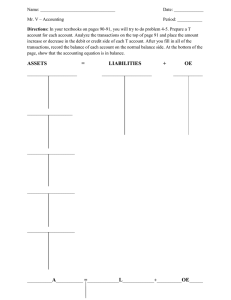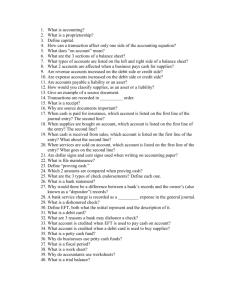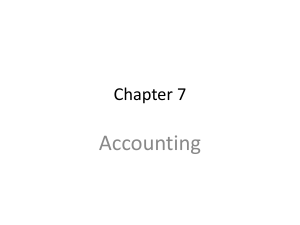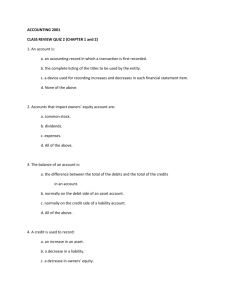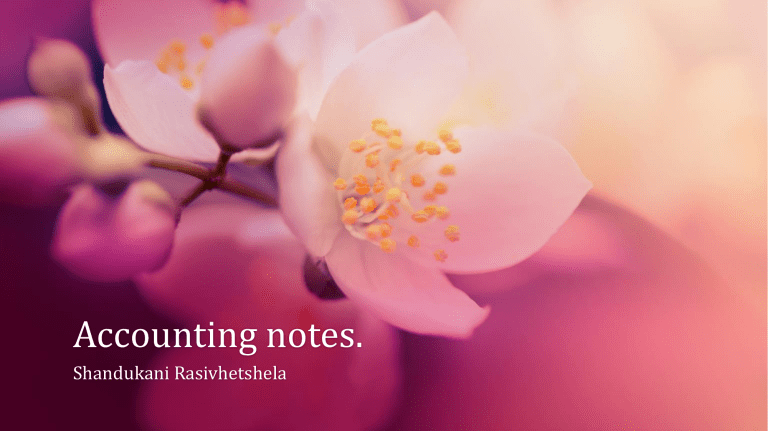
Accounting notes. Shandukani Rasivhetshela The four categories of bookkeeping. • Assets • Liability • Income • Expenses Accounts which are debited and credited. • in an asset/expense = Debit • in an liability/income =credit • in a asset/expense = Credit • in a liability/income = Debit General Ledger… • Balance sheet section: Assets, Liabilities, OE(Capital, Drawing) • Nominal accounts section: Income, Expenses. Double entry method. A = OE+L Capital - drawings + Income Capital= OE CR D= OE DR Income- expense I= Profit = OE CR E= Profit = OE DR General Ledger(Contra Accounts) CRJ CPJ • Bank: Total receipts • Bank: Total payments • Sales: Bank • Trading stock: Bank • Cost of sales: Trading stock • Stationary: Bank • Capital: Bank Petty Cash: Total Payments. Trial balance. • The Trial Balance is the summary of the account balances in the General Ledger. he accuracy of the double entry system is tested by doing the Trail Balance. • When adding up all the debits in the Trial Balance, they should be equal to the total of the credits. • The Trial Balance is only prepared at the end of the month. • The Trial Balance is split into a Balance Sheet Section (capital, drawings, assets and liabilities) and the Nominal Accounts Section (income and expenses). • When determining whether to allocate a total/balance to the debit or the credit column of the Trial Balance, use the principles of the Accounting Equation. • The order that the accounts are listed in the Trial Balance is important: • Balance Sheet Section: Capital; Drawings; all Non-Current Assets from least liquid to most liquid; all Current Assets from least liquid to most liquid; Loans; Creditors Control. • Nominal Accounts Section: Sales or Current Income; Cost of Sales; all Income and Expense accounts in any order. Economics notes. Economic systems. • Government: South Africa has 3 levels of government namely National, Provincial and Local government. It has a separate judiciary. • The National budget: Government revenue income it receives from various source. • Standard of living describes how societies live. • Markets: The goods and services market is where products and services are bought and sold. Entrepreneurship. • Factors of production: Capital, labour and natural resources. • Forms of ownership: Sole trader, partnership, Private company and public company. Levels and functions of management. • Managers are needed as business grows, and are responsible for different areas of the business. • Managers are responsible for planning, organising, leading and controlling tasks and workers in their particular are of the business in order to reach their goals. Economic cycle. Physical flow: This is the flow of goods and services from firms to households and government. Monetary flow: This is the flow of money from households and government to firms why they consume goods and services. Debtors control D Details debit 31 Alan Martins 865 credit drawings 735 stationary 130 J Small 430 Bad debt AM Traders 147 147 A Cona 380 Discount allowed 20 Cash Payment Journal Repairs 400 20000 Land and building R Lewis 20000 1250 credit debit 430 430 Interest charged debit creditors control 430 credit vehicle bank Packing Material Bank Trading stock bank bank Rent income Bank Rent income Bank Loan acc +50000 +700 +-500 +1200 +-60000 +100000 50000 +700 +-500 +1200 +-60000 80000
